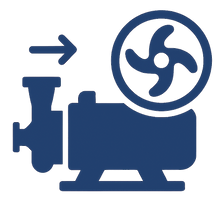
Centrifugal Pumps That Provide Consistent Flow and Pressure
Centrifugal pumps are a reliable solution for moving liquid in many sectors. They operate by converting kinetic energy from the motor into fluid pressure using an impeller. The pump’s design allows the fluid’s velocity to increase and the pressure increases as it moves through the volute casing. Centrifugal pumps work in irrigation, domestic water supply, chemical transfer, and industrial applications. They suit agricultural and industrial needs where a smooth and efficient flow is critical. Our wide range covers different capacity requirements and setup options to maintain systems running effectively.
Why Choose a Centrifugal Pump for Your Water Pump Applications
A centrifugal pump uses centrifugal force to move pumped fluid through the system. The fluid enters the inlet and passes through the impeller’s vane. As the impeller rotates, the kinetic energy transfers to the liquid. The diffuser or pump casing then directs the flow toward the outlet. This operation delivers reliable pressure for a wide spectrum of uses, including water supply, feed processes, and petrochemical duties. The component structure is simple and suitable for high capacity and high-pressure requirements. Each unit is a dependable device built for reliability and minimal maintenance.

Our Extensive Range of Centrifugal Pumps for Industrial and Commercial Use
We stock an extensive selection of centrifugal pumps to meet industrial needs. Each unit offers efficient operation for agricultural, domestic, and industrial applications. The pump casing is engineered for strength and resistance to failure. Options include multistage and self-priming models to suit complex system configurations. These pumps handle water, chemical, and other liquid types with ease. They operate smoothly to ensure long service life. The dimensions of each pump matches the requirement of the industry it serves. Spare parts and fitting options are available to keep your installation running without interruption.

How Impeller Design Impacts Centrifugal Pump Performance
The impeller is the key component that drives fluid movement in a centrifugal pump. Its vane shape and rotational speed determine the efficiency of the pump. As the impeller rotates, the pumped fluid gains kinetic energy and fluid pressure. The impeller’s design also affects the outlet flow and the ability to handle resistance in the system. In high volume installations, a diffuser and volute casing improve the ability of the pump to maintain pressure as water exits the pump. The shaft and mechanical components work with the motor to deliver a reliable solution for both industrial and domestic applications.

Common Application Types for Centrifugal Pumps in Engineering Projects
Centrifugal pumps suit a wide selection of engineering and process applications. They are used in agricultural and industrial water supply, chemical transfer, and irrigation setups. The configuration may involve a high-pressure multistage unit for large-scale performance. Each application benefits from the pump’s efficient function and size to handle various fluid types. Centrifugal pumps are suitable for pipe networks where smooth flow and consistent pressure are essential. They provide reliability in both feed processes and industrial applications that require effective liquid transfer and resistance to failure.

Selecting the Right Centrifugal Pump for Your Water Pumps Needs
A proper selection ensures the centrifugal pump meets your requirement and delivers high performance. Factors include the type of fluid, desired volume output, pressure level, and the specific system configuration. Consider whether you need a self-priming unit or a high-pressure multistage model. Check if the pump is suitable for the liquid’s condition and if spare parts are available. Reliable performance depends on correct fitting, maintenance, and matching the pump to the intended application. With the right choice, you get a device that operates smoothly, maintains efficiency, and keeps your systems running without costly downtime.
